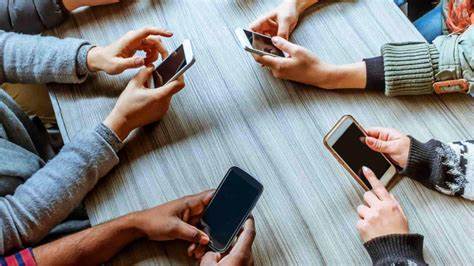Personal Perspective: How did this happen and what can we do about it?
By Thomas Franklin, MD, and the Group for the Advancement of Psychiatry’s Psychotherapy Committee
You are addicted to your phone.
Yes, you.
Your day revolves around pings, buzzes, likes, and notifications that your elixir collector is now level 7 (finally!) or that Target has a coupon for you, or that someone in your college friend group-text just made a cake. When you wake up in the morning the first thing you do is roll over and look at your phone, and the last thing that happens before you go to sleep is you drop it on your face as you look at gardening YouTube videos until you collapse from exhaustion.
In between, you are glued to it, taking it with you to the bathroom, and looking at its screen for hours a day as life goes on around you. When your screen time ping happens every Sunday morning you explain away the 9 hours a day it says you are looking at it. That was all work emails or newspaper reading, you tell yourself.
You dropped it in the toilet the other day as you scrolled through Instagram. You lunged into the bowl, rescuing it from certain disaster as it landed in a (mostly) dry situation. But it’s wet now. What to do? You know if you turn it on it might fry the whole thing. Wasn’t there something about rice you heard about? You wish you could check the internet. But your son is on the desktop playing some game with his friends. And you don’t want to admit that you dropped it like this.
OK, it’s in a bowl of rice now. You look up and wonder what to do. The anxiety builds as you suddenly face the prospect of having to deal with your own thoughts for the first time in months. You have…feelings. Boredom. Insecurity. Loneliness. You make an awkward attempt at conversation with your partner who looks up from their phone just long enough to placate you as you deal with very real withdrawal symptoms. Your heart rate is up, and your thoughts begin racing as you are overcome with dysphoria. You fantasize about all the critical stuff you are missing while your phone is encased in rice. You think you hear the ping that means you have a new critical piece of information to consume, but it’s just the microwave letting you know your son’s popcorn is done.
How did it come to this?
Your phone is designed to be addictive. Multibillion-dollar corporations have used all its features to play your brain like the instrument it is. It gives you little shots of dopamine all day long like a rat in an experiment being dosed with sugar, food pellets, or cocaine. The more attention you give it, the more money they make. So they made it work like drugs work. And if you are at all susceptible you are down the rabbit hole. Just as surely as you would be if you were addicted to cocaine with tolerance, withdrawal, and ongoing use despite it causing problems with work or relationships, an inability to cut down, and so much time devoted to its use that the rest of your life begins to be organized around it.
What can we do?
First, respect the fact that a smartphone and its apps are dangerously addictive, especially for children and youth. It should be thought of as something that requires stringent controls and be used in moderation. It’s cotton candy for the mind. W hat we need to grow and develop and be contended is a varied diet of stimuli, real-life social connectedness, and actual problems to solve. Some ways to take control back:
- Turn off all notifications. Look at your phone on your own time. And don’t give every person or entity that knows your phone number or email address the power to intrude on your consciousness.
- Delete social media apps such as TikTok, Instagram, and Facebook from your phone. You can look at them on your computer on your own time, but having them so handy is dangerous. If you take a 3-week break from them, you will begin to realize they were not adding much of anything to your life. And you won’t go back to giving them so much of your time.
- Consider a phone with limited features designed to make the cellular phone a tool again rather than an anxiety-inducing source of clickbait.
- Do not let children and teens have smartphones at all. Their developing brains and maturity are not all at all prepared to handle what is essentially like having a liquor store in their pockets in terms of addictive potential.
- We have heard of having smartphone and social media holidays during which we unplug for a day each weekend or a week in the summer. Let’s turn that advice on its head. Treat this device like alcohol, cake, or anything else we need to consume in limited quantities to be healthy. Maybe we should only be using some of this stuff for a few minutes a day. Or on vacation or after 5:00 pm.
- Avoid anything that “gamifies” an activity that should be thoughtful and deliberate, like investing or raising your infant or eating. Also, avoid any game with in-app purchases.
- Have you had “smartphone thumb” or another physical ailment from excessive smartphone use? Treat it like the wake up call that it is and get a flip phone.
- Rediscover real-life human interaction again. Tolerate feeling bored; It’s how every great adventure begins.

